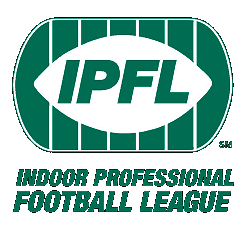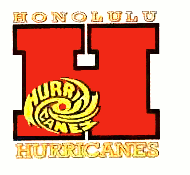
The Professional Indoor Football League (PIFL) was the second league to successfully play indoor football as a paid pro-league sport, after the Arena Football League (AFL). Since the AFL had a patent given in 1990 on the gameplay of "Arena Football", the PIFL played with mostly the same rules, but without the endzone nets. The PIFL only lasted one season (1998) under that name.

The Indoor Professional Football League (IPFL) was the new incarnation of the Professional Indoor Football League (PIFL), which started in 1998. Two of its teams left the league and their owner, Kerry Ecklund, founded the Indoor Football League in 1999. The IPFL led a troubled three-year existence, and died after its 2001 season, with its most successful teams joining up with the National Indoor Football League.

The Bloomington Edge was a professional indoor football team based in Bloomington, Illinois. While it was in operation, the team hosted home games at Grossinger Motors Arena. Originally named the Bloomington Extreme, the team was a member of United Indoor Football (UIF), and joined the Indoor Football League (IFL) in 2009 during the UIF and Intense Football League merger. They left the IFL for the Champions Professional Indoor Football League (CPIFL) in 2013, and in 2015 the CPIFL merged with the Lone Star Football League (LSFL) to create Champions Indoor Football (CIF), where Bloomington did not follow and joined X-League Indoor Football (X-League). Following the 2015 season the Edge joined the CIF. The Edge then announced it had rejoined the IFL for the 2018 season, but a court ruling prevented the team from joining the league until 2019, however, they were not included in that season's schedule.

The Peoria Pirates were a professional arena football team that last played in AF2, the minor league to the Arena Football League (AFL). They played their home games at Carver Arena, part of the Peoria Civic Center in Illinois, and were coached by Mike Hohensee and Bruce Cowdrey. The Pirates originally began play as a charter member of the original Indoor Football League in 1999.

The Louisiana Bayou Beast were a team in the Professional Indoor Football League (PIFL) in 1998, in the Indoor Professional Football League (IPFL) in 1999, and reincarnated in 2001 in the National Indoor Football League (NIFL). The Bayou Beast franchise was owned by James (Sr.) and Carolyn Shiver, who currently own and operate the NIFL which is based in Lafayette, Louisiana. competed in the PIFL in 1998, playing their home games at the Pete Maravich Assembly Center on the LSU campus in Baton Rouge. The team colors were red, black, and white. In 1999, the PIFL changed its name to the IPFL, and the Beast changed arenas, moving to the Riverside Centroplex in downtown Baton Rouge for that season.

The Minnesota Monsters were an indoor football team based in Falcon Heights, Minnesota. The Monsters were charter members of the original Professional Indoor Football League (PIFL) in 1998. The Monsters franchise was owned by Robert and Joann Edwards. The team office was based in Minneapolis-St. Paul, Minnesota, and played their games at the Coliseum on the Minnesota State Fairgrounds. The team colors were: Blue, Black, and White/Gold. The Monsters were coached by Ron Simmons for the few PIFL games they did participate in.

The Honolulu Hurricanes was a Professional Indoor Football League (PIFL) team based in Honolulu, Hawaii, that competed in the 1998 season. According to the team's media guide, the ownership partners – registered as Pro Sports Limited Liability Company – were Rev. John Frederick, the team's founder and co head coach ; Sig Schuster, the CEO; Dennis Enomoto; Neil Wiedemann; Louis "Sonny" Souza, the team's on-field coach; and James K. Wong. The team office was based in Honolulu, and played their home games at the Neal S. Blaisdell Center, also in Honolulu. The team colors were red and gold. The Hurricanes were coached by the Hawaii Police Department's Louis "Sonny" Souza.
The Colorado Wildcats was a team in the Professional Indoor Football League (PIFL) in 1998. The Wildcats franchise was owned by Gary Kozacek, who also was head coach/owner of the same Wildcats team for the previous 9 years, as they competed in semi-pro football in and around Colorado. The Wildcats played their home games at the Denver Coliseum, with the team office also located in Denver, CO. The team's colors were: Old Gold, Purple, and White. Colorado's head coach listed in the 1998 PIFL league media guide was Larry Jobe, but the actual head coach was Collins Sanders.

The Green Bay Bombers was an indoor football team that played in the Professional Indoor Football League (PIFL) in 1998, and in the Indoor Football League (IFL) in 1999 and 2000. The Bombers franchise was owned by Keary Ecklund. The team office was based in Neenah, Wisconsin, and played their games at the Brown County Veterans Memorial Arena. The Bombers were coached by Mario Russo for the 1998 PIFL season and part of the 1999 IFL season and by Bud Keyes for the remainder of the 1999 and 2000 IFL seasons.

The Madison Mad Dogs were an indoor football team that played in the Professional Indoor Football League (PIFL) in 1998, and in the Indoor Football League (IFL) in 1999 & 2000. The Mad Dogs franchise was owned by Keary Ecklund. The team office was based in Madison, Wisconsin, and played their games at the Dane County Coliseum, now Veterans Memorial Coliseum, at the Alliant Energy Center. The team colors were: Red, Silver, and Black. The Mad Dogs were coached by Richard "Dick" Adams for the '98 PIFL season.
The Bismarck Blaze were a professional indoor American football team based in Bismarck, North Dakota. They were members of the original Indoor Football League founded in 1999 and began play in 2000. They competed in the Northern Division of the Western Conference.

The Wichita Wild were a professional indoor football team based in Wichita, Kansas. They were members of the Champions Professional Indoor Football League (CPIFL). The team was founded in 2006 as an independent indoor football franchise. In 2008, the team joined United Indoor Football (UIF). They joined the Indoor Football League (IFL) during the UIF and Intense Football League merger of 2009. In 2012, the team left the IFL to become charter members of the CPIFL. The Wild's home games were played at Hartman Arena in nearby Park City. When they lost their lease with the Hartman Arena, they folded..

The Indoor Football League (IFL) is a professional indoor American football league created in 2008 out of the merger between the Intense Football League and United Indoor Football. It has one of the largest number of currently active teams among indoor football leagues. As of the 2024 season, the league consists of 16 teams in two conferences with each team playing 16 games over 19 weeks.
The Louisville Xtreme were an indoor football team based in Louisville, Kentucky, with home games at the KFC Yum! Center. They began play as the Kentucky Xtreme in the Continental Indoor Football League (CIFL) in 2013 and 2014. Midway through the 2014 CIFL season, the league removed the team's membership and the Xtreme temporarily suspended operations. After playing the 2015 season in the semi-professional Minor League Football Alliance (MLFA), the team rebranded as the Louisville Xtreme in 2017. In 2020, the Xtreme were added to the American Arena League (AAL) but cancelled its season citing the COVID-19 pandemic. For the 2021 season, the Xtreme were announced to be joining the National Arena League, but instead joined the Indoor Football League three months later.

Champions Indoor Football (CIF) was a professional indoor American football minor league created in 2014 out of the merger between the Champions Professional Indoor Football League (CPIFL) and Lone Star Football League (LSFL), plus one team from the Indoor Football League and two expansion teams.

Ernesto Lacayo is an American football placekicker for the Duke City Gladiators of the Indoor Football League (IFL).

The 2000 Sioux City Attack season was the team's first overall and first as a member of the original Indoor Football League (IFL). One of twenty-one teams in the IFL for the league's second season, the Attack finished the regular season with a 9–5 record to earn the number five seed in the ten-team Western Conference, in which they traveled to Lincoln, Nebraska for the wild card round to play the Lincoln Lightning and defeated them, 52–38. They then moved on to Bismarck, North Dakota, to face the Western's Conference's top-seeded team, the Bismarck Blaze. The Attack had already beaten the Blaze once in the regular season, but fell, 30-14 in the conference semifinals.
The 2018 Indoor Football League season was the tenth season of the Indoor Football League (IFL). The league played with six teams, after the suspension of operations of three teams, the departure of another two teams, and the addition and subsequent suspension of two teams.
The 2018 Champions Indoor Football season was the fourth season of the CIF. The regular season began on March 3, when the Wichita Force traveled to Salina Liberty, losing 17–15. The regular season concluded on June 10. This was the second season in which four teams per conference advanced to the Champions Bowl playoffs, with the top seed in each conference hosting their conference's fourth seed, and second seeds hosting third seeds in the first round.
The 2021 Indoor Football League season was the thirteenth season of the Indoor Football League (IFL). The league played the season with twelve teams, down from thirteen the previous season, by adding one expansion team, one team from the National Arena League, one team from the American Arena League, and four teams going on hiatus. In addition, three existing teams made their IFL on-field debut after the 2020 season was cancelled because of the COVID-19 pandemic.













